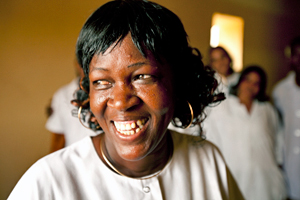April 2012
Kayode Odusote, Foundation for Sustainable Health Development—Nigeria; Carol Bales, Sarah Dwyer, and Dykki Settle, IntraHealth International
 To improve the population’s access to quality health care, a country needs to know how many health workers it has, what their qualifications are, where they are posted, and how many new workers are likely to join them over time. The absence of accurate, readily available health workforce information is a major impediment to effective planning and decision-making on health worker education and training, registration, deployment, and management.
To improve the population’s access to quality health care, a country needs to know how many health workers it has, what their qualifications are, where they are posted, and how many new workers are likely to join them over time. The absence of accurate, readily available health workforce information is a major impediment to effective planning and decision-making on health worker education and training, registration, deployment, and management.
A strong human resources information system (HRIS) helps health-sector leaders quickly answer the key policy questions affecting health service delivery. When quality data and effective reporting are in place, leaders can better understand the current workforce and plan for recruitment, training, and retention.
The West African Health Organization (WAHO) is implementing a regional approach to strengthening HRIS, leveraging resources from CapacityPlus (the USAID-funded global project uniquely focused on the health workforce needed to achieve the Millennium Development Goals), other USAID-funded projects, donors, and global organizations. This approach and CapacityPlus’s involvement are closely aligned with key principles of the US Government’s Global Health Initiative—supporting country ownership and country-led plans, encouraging sustainability through health systems strengthening and capacity-building, and leveraging partnerships.
This technical brief provides an overview of this regional approach, highlights lessons learned, and provides recommendations for other regions and countries to adopt the approach.
Next >>
A printer-friendly version is available.